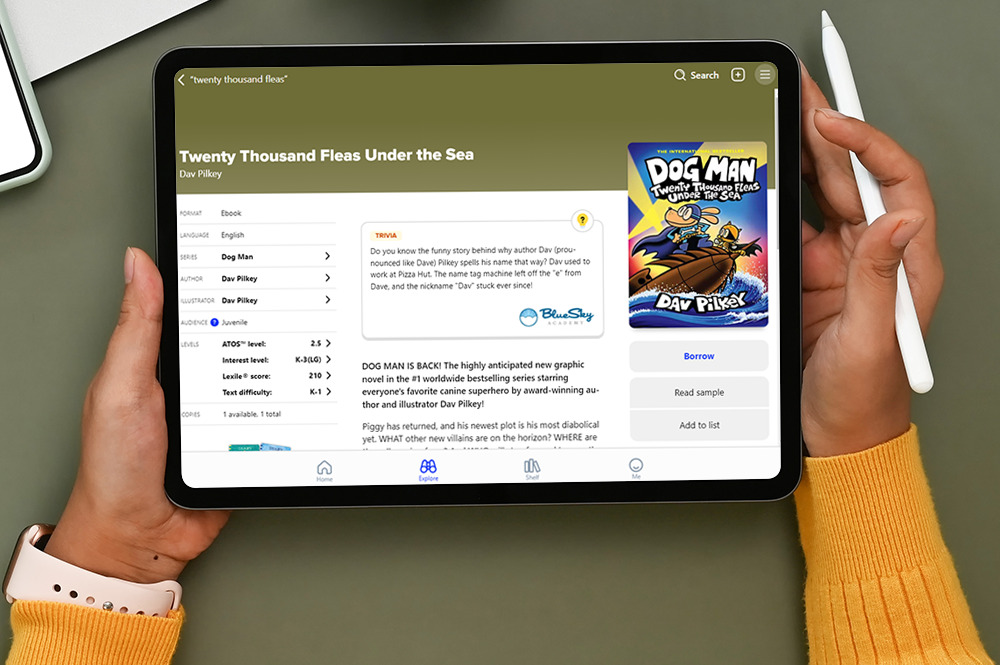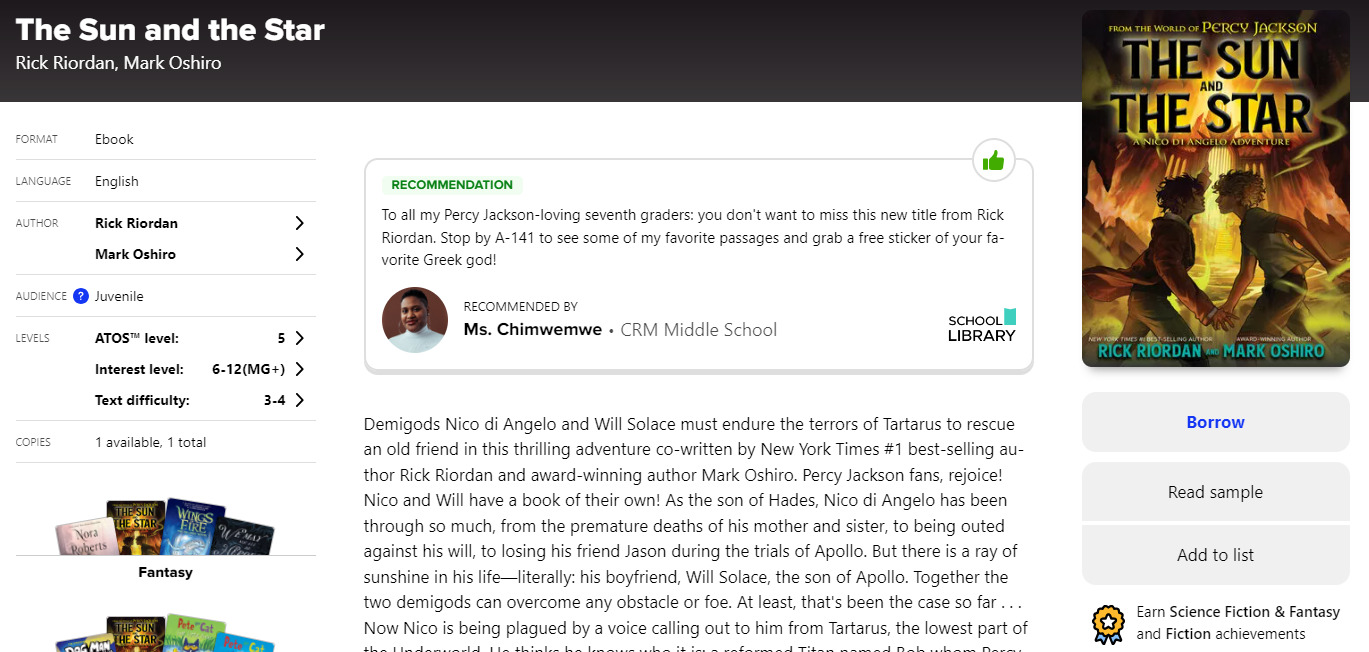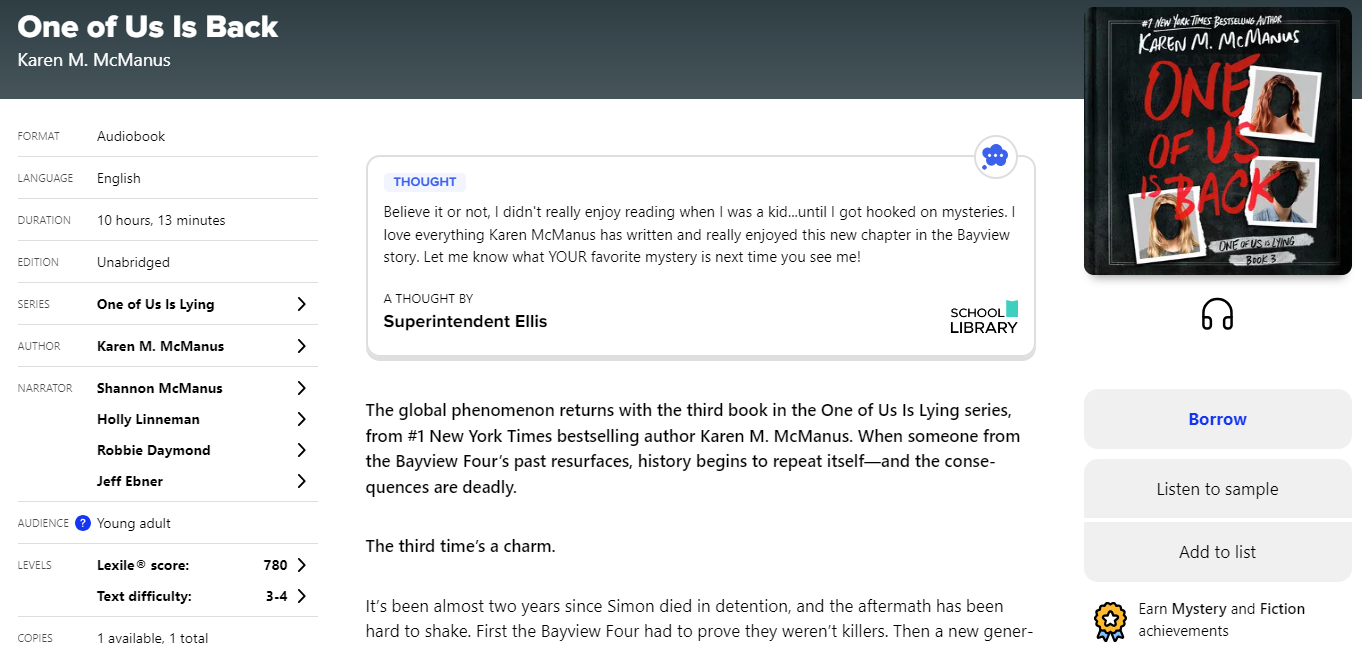
A virtual conversation: 4 creative ways to use Sora’s shelf talkers in the classroom
By: Sydney Kalnay, Training Manager
Shelf talkers are a way for educators to leave a virtual note on a title so students can see them when they’re browsing in Sora.
What we love about shelf talkers is the way they can spark interest in—or even a future conversation about—a title while the student is on her reading journey. They appear seamlessly alongside other pertinent information about the title and add a little extra personality to the book, encouraging students to engage further.
There are four types of shelf talkers you can add: recommendation, favorite quote, trivia, and thought. While each of these, at a glance, seem self-explanatory, we’ve compiled a few examples of creative ways to use them in your classroom.
1. Recommendation
A recommendation is… exactly what it says on the package: a way to add your stamp of approval to a book. You could recommend a book that changed the way you read or introduced you to the wonderful world of reading; you could call out the audio version of a title to let students know about the rich experience of listening to an award-winning narrator.
Or you could ask your students to identify 2-3 titles in Sora with existing shelf talker recommendations and then ask your class to write one for their favorite book. They could study the style of a recommendation, you could have a class discussion about what makes a good (or bad) recommendation, and you could discuss the pros and cons of writing engaging prose within a character limit.

2. Favorite quote
One of the best parts of reading is coming across a line or a passage that makes your heart sing. Beautiful, effective, surprising prose is one of life’s great joys. A great way to connect students to a book is to pull out the quotes that encapsulate the soul of the story, whether that’s a killer opening line, an amazing metaphor or turn of phrase, or a snippet of dialogue that brought you to your knees.
A fun warm-up activity for your class could be to give them a list of titles where you’ve called out your favorite quote with a shelf talker. Then, students could do a (melo)dramatic reading of those quotes in a variety of voices. Think: weird inflection, placing the emPHAsis on the wrong syllABLE,… even their best impression of you! This is a great way to get students loosened up and ready to engage in a classroom discussion.

3. Trivia
Trivia shelf talkers could be the hidden gem of this feature. Think of them as the easter egg of the Sora experience. Whether you’re an expert on the title and have a hundred facts memorized and ready to share or you have to sneak a peek at the book’s Wiki to find those facts, wowing your students with some fun, odd, or unbelievable trivia is a great way to encourage them to give a book a shot.
A new twist on traditional trivia might be to treat each fact like a “blind item” and encourage students to research the truth. For example, instead of providing the reason why author Dav Pilkey spells his first name without the “e,” you could tag your favorite Dog Man title and ask, “Did you know there’s a funny story about why the author spells his name this way?” and let the fun begin!

4. Thought
A shelf talker thought is arguably the most open-ended option of the bunch. Unlike the examples above, it has the most room for interpretation. It could be a place to ask a question or share an impression. It’s a great way to get folks outside the classroom involved, such as asking the principal or superintendent for their thoughts on a title.
But what if you approached this type of Shelf Talker as the most direct way to speak to your reluctant readers, engaging them in a conversation on their own terms? Think about the titles most likely to appeal to folks who approach the act of reading as a chore. Could you shout out some Minecraft titles or Spider-Man comics? Have a quick thought to share about a beautiful graphic novelization of a core text? Prefer an audiobook version or young reader edition of a title? This is a great way to support titles that meet the needs of your whole school community and draw attention to texts that otherwise might go unnoticed and unread.

Learn more about shelf talkers
How are you using shelf talkers in your classroom? Or, if you haven’t started yet, want to learn more about the process? Be sure to share your best Shelf Talker experience with your Sora account team today!
About the Author
Sydney, the Training Manager at OverDrive, is deeply engaged with technology and education as a creator, developer, and instructor. She has designed and delivered classroom training and e-learning experiences for diverse audiences since 2002. She loves pretending she’s already a famous YA novelist, spending time with her cat-familiar, and listening to nothing but Nothing But Thieves.
Tags In
Browse blog and media articles
Public Library Training
K-12 Library Training